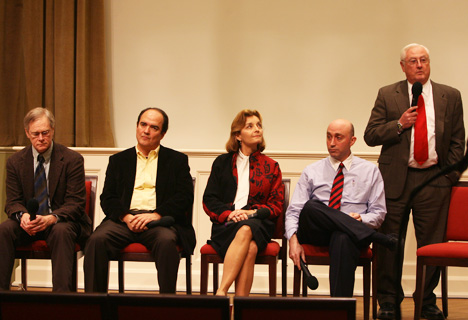Back to B-school: A Briefing on the Economy
Faculty from the business and law schools of the College of William and Mary will present a briefing on the economy on October 20 from 7-8:30 p.m. at Alan B. Miller Hall, home of the Mason School of Business on the College campus in Williamsburg, Va.
The event will focus on an array of current hot button topics ranging from global and domestic economies to finance and investments. It will be streamed live on the internet on the Mason School site.
In its recent ranking, Princeton Review named the Mason business faculty among the 10 best in the country. They will be joined by faculty from the law school, the first law school in the country. This is the third forum since the financial crisis in Fall 2008.
Alumni are invited to take an active role in the briefing, using e-mail, Facebook, and Twitter to submit questions. For alumni, this will be a chance to once again learn from their favorite business school professors.
Moderator Richard Ash, in anticipating this year’s important topics noted, "Everyone is so negative as our economy evolves, we need to let alumni and the local community know what they can expect, how they can make correct investments to take advantage of the economic climate and make people feel more comfortable."
Professors participating represent diverse backgrounds and both the Mason School of Business and the William and Mary Law School:
John Boschen
Professor John Boschen, Brinkley-Mason Professor of Economics and Finance, has extensive experience with the Federal Reserve and has published over two dozen articles in noted economics and finance journals.
"There are some good and bad aspects of the current economy. Previous college students treated jobs as an inherent right. This economy is creating a tougher generation of college students, ones who must cultivate actual skills and fight to succeed in a highly competitive market."
Deborah Hewitt
Professor Deborah Hewitt has extensive experience in International Economics and worked as an international economist at the U.S. Treasury. She has contributed several articles to business and investment publications including Standard & Poor's Credit Week and Bottom Line, as well as The Wall Street Journal and Barron's.
"Overall, emerging countries are really coming out of the recession well. These countries had a stronger position going in, using the previous growth decade to reduce their debt levels dramatically while the United Stated and Europe became heavily indebted. They are developing intraregional trade, lessening their dependency on Europe and the US, and questioning the huge cycles of capitalism in favor of stability. Even if China’s currency is allowed to appreciate, it will not help us. If the government imposes a tariff as a punitive measure, it would simultaneously raise the price to American consumers, increase Mexican and Thai exports, and do nothing to increase employment and production levels."
John Merrick
Professor John Merrick, Richard S. Reynolds Associate Professor of Business, has split his time between academia and Wall Street, and currently serves as a Professor of Economics and Finance.
"We have done a lot of healing. From now on our economy will move away from its market-driven past, and instead will return to economic fundamentals."
Richard Ash
Professor Richard Ash, Professor of Entrepreneurship, Venture Capital, Management, and Financing of Small Business Enterprises.
"People are afraid, pulling money out of equities and willing to accept 1 to 2 percent for returns. An important topic of the Forum will be ways to fix this, and what the government has to do."
Eric Kades
Law School Vice Dean and Professor Eric Kades will bring decades of experience in Economic Analysis of Property and Law.


